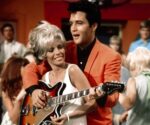Elvis Presley was embarrassed by more than the kinky allegations surrounding his 1964 film | Films | Entertainment
Can you ever have too much Elvis? 40 years ago, film studios hoped not when they cast the rock and roll legend in the 1960s light comedy Kissing Cousins.
Released in March 1964, on the surface it looked like just another frothy confection of tangled romances, intercut with jaunty songs, but there was a big twist.
Unfortunately, it was not the twist the producers were hoping for as one central aspect of the plot and the song lyrics became the focus of ridicule and even outrage. Not to mention the dodgy blond ‘do or the even creakier special effects (even for that time) that caused embarrassment for a star increasingly desperate to get off the B-movie merry-go-round.
Just look at the clip from the title song below – even a performer as charismatic and natural on camera as Elvis looks ill at ease and check how obvious the extra is in a wig playing him from behind…
The gimmick was that Elvis played two characters, US Army soldier Josh Morgan and his country hick third-cousin Jodie Tatum. Josh is used by his superiors to convince his distant family to lease their land in the Tennessee Mountains for a missile base.
The two look identical, except Josh has Elvis’ distant dark hair, while Jodie spots a rather obvious wig and stereotyped hillbilly mannerisms.
Naturally for the time, the region is awash with beautiful and scantily clad women, including Josh’s cousins Azalea and Selena Tatum (Yvonne Craig and Pamela Austin.) There’s also a rampaging pack of single ‘gals’, nicknamed the “Kittyhawks, the most beautiful collection of mountain cuties ever!’ Looking rather like the gaggles of girls in the background of every Elvis film, they’re on the hunt for eligible bachelors – especially army boys.
So far, so predictable. Even the fact that Josh’s own cousins are fighting over him and he eventually picks Azalea (pairing Selena off with an army pal), didn’t raise too many eyebrows at first. But it was the title track that really put the issue front and centre.
Lyrics included: “Kissin’s allowed ’cause we’re proud to be cousins. What’s a little teasin’, huggin’ and a-squeezin’, Between us cousins?” Later on, it adds, “Honey we dress and we mess, We’re just cousins, Cousins, kissin’ cousins!”
There was much ridicule over the suggested incestuousness of it all, which has only grown over the years. Critics, unsurprisingly, weren’t kind, adding to Elvis’ misery as he watched his lifelong dreams of also making it as a credible actor disappearing in one cheesy, cardboard cutout movie after another.
His manager Colonel Parker notoriously only cared about the upfront fee he charged for his client and that costs were always kept to an absolute minimum on the shoot.
And so, despite the novelty and marketable angle of having Elvis play two characters at once, and the potential for the star to really stretch his acting chops, the amusing angle that the cousins looked identical was barely explored in the film.
Even worse, Parker’s parsimoniousness meant that the special effects used to put them in the same scene together were cheap and obvious. It cost $750 each time to put the two Elvis’ in the same shot and so it was only done four times throughout the whole film. Just look at the glaringly obvious empty space with only straw and rock in the shot below.
Critics skewered the tired format and lazy filmmaking. Furthermore, musicals were fading out of fashion – and the usual format of randomly bursting into song mid-scene was increasingly viewed as corny and ridiculous by filmmakers and audiences alike.
In the end, the film hit number 11 and earned a respectable $3 million, standard for most of Elvis’ films in that period. Only its successor, the smash hit Viva Las Vegas with Ann Margret would give the star a brief box office boost, banking $9.4million.
The Kissing’ Cousins soundtrack was a hit, reaching number six on the Billboard charts, while the controversial song made it to number 12 in those more ‘innocent’ times.
Probably most frustrating for The King was the fact that even the critics believed he deserved so much better than the lazy vehicles he was too often forced into. Variety noted: “Presley needs — and merits — more substantial material than this if his career is to continue to flourish as in the past.”
Unfortunately, of course, his film career never came close to fulfilling the potential that critics and many co-stars saw. His final film was 1969’s gritty Change of Habit and a potential comeback opposite Barbra Streisand in A Star Is Born sadly fell apart.











